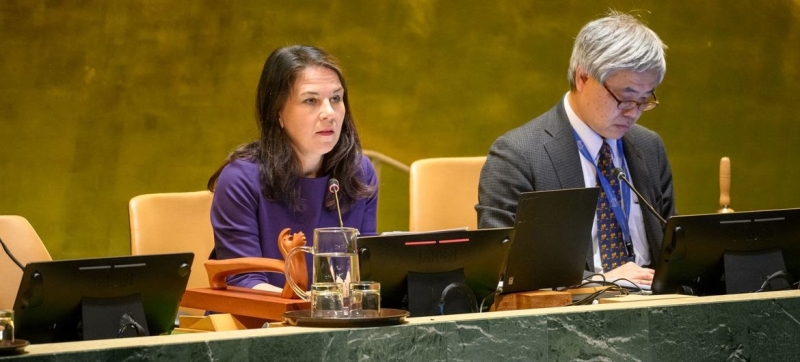- Fire at UN climate talks in Brazil leaves 13 with smoke inhalation |
- 5mmcfd gas to be added to national grid from Kailashtila gas field |
- ArmArmed Forces Day: Tarique's message draws on historic closeness |
- UNGA urges renewed int’l efforts for a resolution of Rohingya crisis |
- First National AI Readiness Assessment Report Published |
Baerbock Warns UN Veto Power Is Fueling Global Gridlock

General Assembly President Annalena Baerbock chairs a meeting on the report of the International Criminal Court.
General Assembly President Annalena Baerbock warned on Thursday that repeated deadlock in the Security Council has become the “poster child” for wider global gridlock, undermining trust in multilateral institutions.
The UN was founded to “save succeeding generations from the scourge of war,” Ms Baerbock said, but the organisation is struggling to meet that mandate when the Council is blocked by a veto from one of its five permanent members — China, France, Russia, the UK and the US.
“Real people, watching in real time, may question the credibility and legitimacy not only of the Security Council, but of the UN in its entirety,” she told Member States.
State of play
Ms Baerbock noted that the Council has been paralysed on “the most devastating conflicts”, including crises discussed earlier in the week.
The Veto Initiative
Ms Baerbock highlighted the Assembly’s Veto Initiative as one way the wider membership is trying to respond.
It requires an Assembly debate whenever a veto is cast in the Council.
It allows the UN to show that “even when facing a blockage in the Council”, it still hears “the desperate voices of those affected by these conflicts”.
She pointed to the recent New York Declaration on the Palestinian question, backed by 142 Member States, as evidence of strengthened cross-regional cooperation.
What she’s saying
Ms Baerbock urged the Assembly to consider expanding its role:
Should new tools be developed to “complement” the Initiative?
Should the Assembly issue recommendations to conflict parties — or even to the Council — “if the Council is unwilling or unable to act”?
These questions, she said, highlight the need to see the UN “not only as one body but as a family together”.
Between the lines
Ms Baerbock acknowledged that it was “unfortunate” that the Initiative was needed at all, as it reflected deeper dysfunction within the global body. But she stressed that it provided a crucial space “to step in when needed; to hold ourselves and each other to account; to demonstrate intent and take action”.
Real-world consequences
Ms Baerbock’s call to action is not theoretical: vetoes have had profound impacts on people’s lives.
In June 2025, the US vetoed a Security Council resolution that would have demanded an “immediate, unconditional and permanent ceasefire” in Gaza — a text supported by 14 of the 15 members. The US defended its decision, saying the draft resolution did not condemn the actions of Hamas fighters who killed some 1,200 Israelis in the October 2023 attacks.
Similarly, in February 2025, Russia vetoed amendments to a European-backed resolution on Ukraine, including one calling explicitly for respect for Ukraine’s sovereignty and another urging a just and lasting peace in line with the UN Charter. Russia launched its full-scale invasion of Ukraine on 24 February 2022.
Context: The Veto Initiative
Established in April 2022 by a General Assembly resolution, the Initiative requires the Assembly to meet within 10 working days of any veto in the Security Council. It does not override the veto, but it guarantees a public and accountable debate on each use and its implications.

